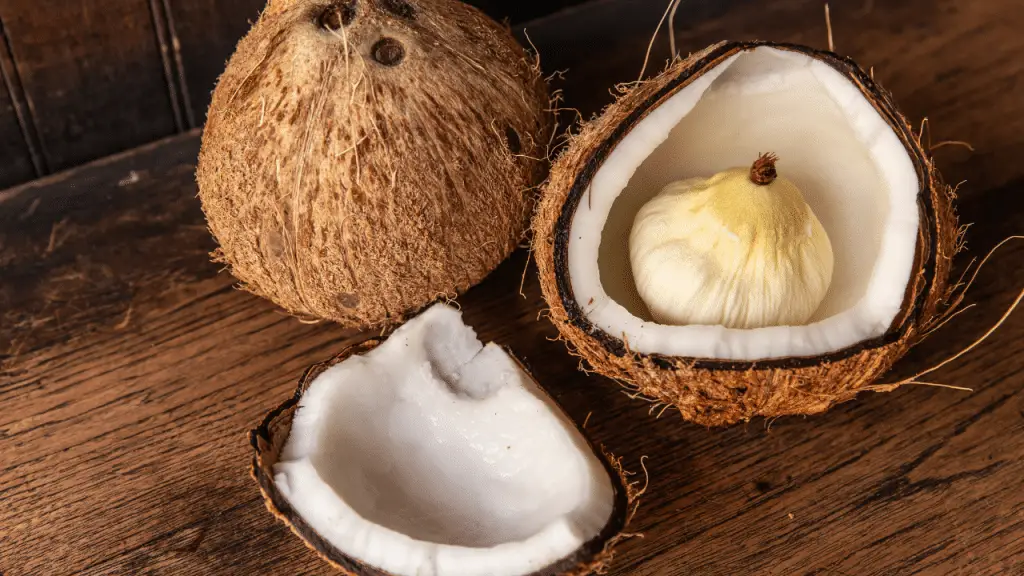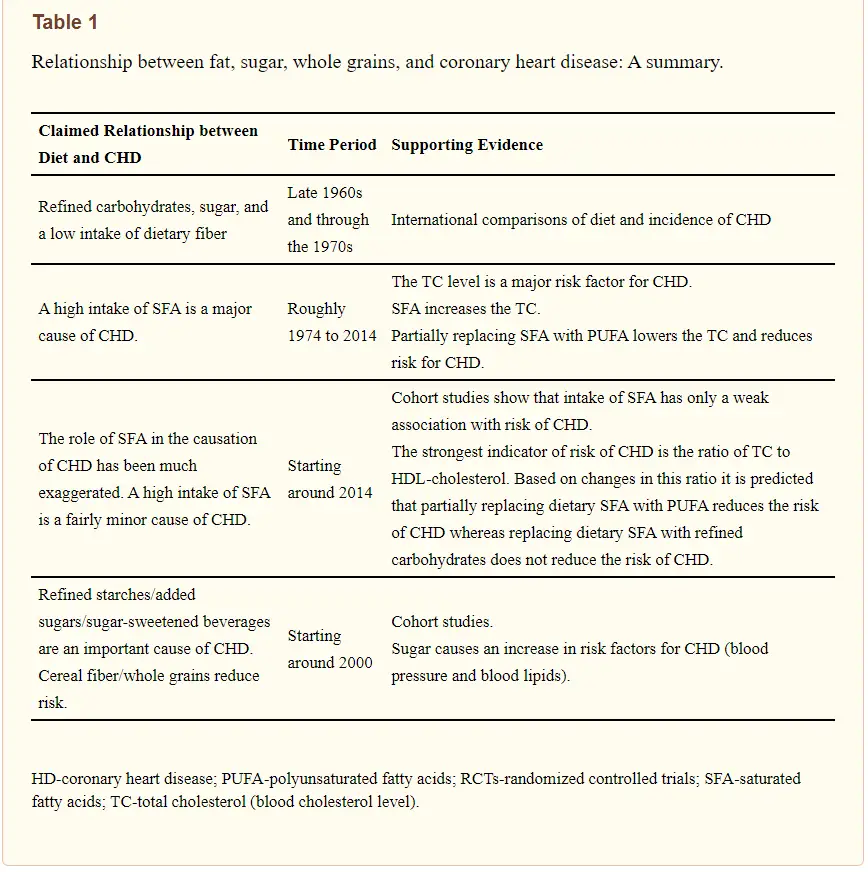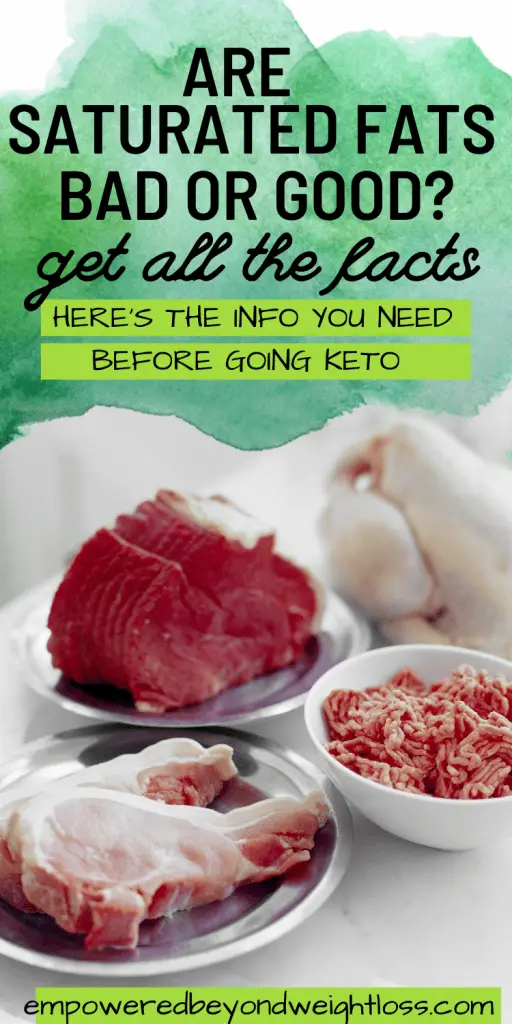I love your comments on my YouTube channel. I get so many blog post ideas from them! In this post, I will address the question: Are saturated fats bad or good? One viewer commented about the harmful effects of saturated fats in my Keto Coffee video. I first thought it was a myth to say that saturated fats are harmful. I remember vaguely reading about it a few years ago. However, I thought diving deep into the topic would be interesting. It doesn’t make a difference to me whether saturated fats are bad or good. I want to know what the most reliable studies say. If you are curious, too, keep reading!

What Are Saturated Fats?
Fats fall into three main categories:
- Saturated fats
- Unsaturated fats
- Trans-fats
Saturated fats have that name because they are saturated with hydrogen molecules. This saturation of hydrogen molecules makes saturated fats solid at room temperature. Another chemical characteristic of saturated fats is that they only contain a single bond between carbon molecules (I have no idea what that means, but I thought I should mention that for those who understand chemistry).
Sources of Saturated Fats
The two main sources of saturated fats are animal products (milk, cheese, and meat) and tropical oils (coconut oil, palm oil).
Are Saturated Fats Bad or Good?
Saturated are often grouped with trans-fats in the “bad fats” category. For decades health organizations have recommended replacing saturated fats with refined vegetable oils like vegetable and canola oil. Meanwhile, heart disease rates have kept rising.
Furthermore, many studies have contradicted the recommendation to avoid saturated fats in favor of vegetable oils. Let’s look at a few of them.

Studies That Assess Whether Saturated Fats Are Good or Bad for You
Many of us think carbs are bad, fats are good, or carbs are good, and fats are bad. It doesn’t work that way. Although there is a lack of evidence to support the notion that saturated fats are bad for you, the fiber in whole grains may be beneficial. However, refined carbohydrates are a no-go.
Fat, Sugar, Whole Grains and Heart Disease: 50 Years of Confusion
I enjoyed reading Fat, Sugar, Whole Grains, and Heart Disease: 50 Years of Confusion.
The bottom line of this study is this: for optimal cardiovascular health, consume more whole grains, and less refined carbohydrates. Saturated fats only have a weak association with the risk of cardiovascular disease.

Dietary Saturated Fat and Heart Disease: A Narrative Review
Here’s another review: Dietary saturated fat and heart disease: a narrative review. This meta-analysis reviewed 9 observational studies and 10 randomized controlled trials. The consensus is that there is a lack of evidence for an association between saturated fats and coronary heart disease.
Dietary Total Fat, Fatty Acids Intake, and Risk of Cardiovascular Disease: A Dose-Response Meta-Analysis of Cohort Studies
This is the last document I will look at with you before we move on and talk a bit about how saturated fats affect your body. The conclusion of Dietary total fat, fatty acids intake, and risk of cardiovascular disease: a dose-response meta-analysis of cohort studies again is that not only saturated fats do not increase cardiovascular disease rates, but that total fat, saturated fats, monounsaturated fatty acids, and polyunsaturated fatty acids intake were not associated with the risk of cardiovascular disease.

How Saturated Fats Affect Your Body
I figured it wasn’t enough to examine the association between coronary heart disease and saturated fats. We need to determine if we can consume as many saturated fats as we want without ill effects. Even if the recommendation to replace saturated fats with refined vegetable oils is wrong, it doesn’t mean we should go crazy on the ghee and the coconut oil. Could it still be preferable to favor food sources of monounsaturated fats (avocados, olives, olive oil) and polyunsaturated fats (fish, nuts, and seeds)?
According to Havard Health Publishing:
You may wonder isn’t fat bad for you, but your body needs some fat from food. It’s a major source of energy. It helps you absorb some vitamins and minerals. Fat is needed to build cell membranes, the vital exterior of each cell, and the sheaths surrounding nerves. It is essential for blood clotting, muscle movement, and inflammation. For long-term health, some fats are better than others. Good fats include monounsaturated and polyunsaturated fats. Bad ones include industrial-made trans fats. Saturated fats fall somewhere in the middle.
The truth about fats: the good, the bad, and the in-between
How Can Saturated Fat Fall Somewhere In Between Good and Bad?
The idea is still that saturated fats tend to increase your total cholesterol and contribute to blockage of the arteries. Even though the reports we looked at previously concluded there is not enough evidence to support that saturated fat increases the risk of heart disease, replacing saturated fat with polyunsaturated fat(from whole foods, not refined oils) may reduce the risk of heart disease.

Could It Be Healthy to Consume MORE Saturated Fat?
So far, we have looked at evidence that saturated fats are not particularly harmful in moderation. What about saying that MORE saturated fats are healthy? Many health experts swear by the carnivore diet, for example. I have seen the effect on a few of them I follow. These people tend to look better and younger after adopting the carnivore diet for a few months. However, I think that the reason for their improved health isn’t necessarily the increase in saturated fat, but rather the complete avoidance of refined carbs (maybe even carbs in general?). That being said, I came upon an article by Tim Ferriss that explains 7 Reasons to Eat More Saturated Fat.
He says that saturated fats reduce the levels of a substance called lipoprotein (a)—pronounced “lipoprotein little a” and abbreviated Lp(a). This protein strongly correlates with your risk of heart disease. Eating saturated fat is the only way to reduce this lipoprotein.
He also mentions that saturated fats are required to absorb calcium. I did some research and found that fat is necessary for calcium absorption, and a high-fat diet improved bone density. However, the study also points out that the type of dietary fat doesn’t matter. In fact, using only saturated fat had adverse effects.
Lastly, he mentions liver health and lung health. Again, aside from the well-documented research to support the protective effect of saturated fat to protect the liver from alcohol, I didn’t find much support for his other arguments.
Read the article yourself, if you are curious. Again, my job is to research to save you some time, but you are responsible for your health.
Lastly, read this article by the Weston Price Foundation: Why You Shouldn’t Fear Saturated Fats.
Video
In Summary
Fatty acids are essential to your health. There is no doubt about that. That is one of the reasons why the Mediterranean diet (would you like a guide to switching to the Mediterranean diet? I have one coming soon!) has repeatedly proven to promote optimal health. The question is can you consume too much-saturated fat? Maybe! That’s my answer! I am not worried about it. However, if you have a history of cardiovascular disease, you may want to consume fat l from olives, olive oil, fish, nuts, and seeds rather than butter, cheese, and coconut oil.





